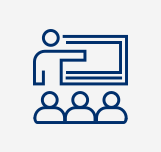Promoting New Partnerships
RTAC has a network of more than 1,000 university researchers comprised of graduate and post-doctoral students, lecturers, and faculty affiliated with organizations around the world. Since its inception, RTAC has partnered with a diverse group of partners, with activities varying in geographic scope, technical focus, complexity, and scale. In line with RTAC’s goal to engage a diverse range of academic partners on a competitive basis, fifteen percent of these major research activities were implemented by universities based in low- and middle-income countries and 15 percent were implemented by U.S. minority-serving institutions.Photographer: Alyssa Cleland
The Benefits

Conduct Research and Provide Technical Assistance
Academic researchers in the RTAC network are granted access to an exclusive database of short-term, USAID-funded research opportunities. Research opportunities can include conducting literature reviews, secondary data analysis, applied research, or program evaluations in countries where USAID works. Researchers in the network can also be tapped to provide remote technical assistance. Support includes: providing expert advice, consulting on proposal design, developing and refining research questions, or designing evaluation plans.

Participate in Expert Panels and Agenda-Setting Consultations
RTAC organizes expert panels, agenda-setting consultations, and convenings around emerging and cutting-edge development topics. These convenings bring together stakeholders, including researchers, innovators, local policymakers, implementing partners, and USAID representatives, to identify critical research questions, generate potential solutions, and formulate policy recommendations. Researchers in the network may be invited to serve as a keynote speaker, present as part of an expert panel, or participate in strategic consultations around the Agency’s priorities.

Network and Collaborate with USAID Staff, Researchers, and Other Development Partners
Researchers have opportunities to collaborate with USAID staff, other researchers, and various development partners in countries where USAID works. The RTAC platform also provides a visible space where researchers can promote their research findings, new publications, and development-relevant events hosted by their institutions.

Communicate Your Evidence Effectively
RTAC communicates evidence generated by USAID-funded researchers in compelling and accessible language using a range of visually appealing formats, including factsheets, policy briefs, graphically-rich presentations, short videos, or other formats suitable to the target audience. In partnership with researchers, our communications team identifies target audiences, crafts key messages, and develops action-oriented recommendations. Researchers who participate in USAID-funded opportunities under RTAC may be eligible to receive specialized communications support.

Participate in Training
RTAC designs and delivers specialized training for USAID staff, researchers, and implementing partners on cutting-edge development topics from digital tools to research translation and uptake. Researchers in the network may be selected to develop or participate in such trainings.

Conduct Research and Provide Technical Assistance
RTAC connects USAID Missions, Bureaus, and Independent Offices (MBIOs) to a global network of academic researchers that can provide timely expertise across all USAID sectors and geographic areas. The global network consists of researchers U.S. and in countries where USAID works. Research support can include conducting literature reviews, secondary data analysis, applied research, or program evaluations. In addition, RTAC researchers are available for remote technical assistance, including providing expert advice; consulting on proposal design; developing and refining research questions; or designing evaluation plans.

Convene Expert Panels and Agenda-Setting Consultations
RTAC organizes expert panels, agenda-setting consultations, and convenings on behalf USAID MBIOs, around emerging and priority development topics. These convenings bring together stakeholders, including researchers, innovators, local policymakers, implementing partners, and USAID representatives, to identify critical research questions, generate potential solutions, and formulate policy recommendations. Support can include managing logistics, facilitating international travel, crafting multi-day convening agendas, as well as identifying and securing keynote speakers and panelists.

Translate Research into Action
Through RTAC, USAID MBIOs have access to research translation experts that can help maximize the policy- and program-related impact of USAID-funded research. Our innovative Research-to-Action planning process supports USAID-funded researchers to strategize from the start about how their research can have meaningful uptake at a local, regional, and/or global level. RTAC’s research translation tools equip researchers, local partners, and USAID with resources to help them bridge the research-to-practice gap and maximize the long-term impact of USAID’s research investments.

Communicate and Disseminate Existing Evidence
RTAC communicates evidence generated by USAID-funded researchers in compelling and accessible language using a range of visually appealing formats, including fact sheets, policy briefs, graphically-rich presentations, short videos, or other formats suitable to the target audience. In partnership with USAID and study teams, we identify target audiences, craft key messages, and develop action-oriented recommendations. RTAC provides strategic communications support to MBIOs on how to make evidence and program learning visible and accessible to a wide range of audiences using a variety of dissemination channels. RTAC also provides technical and editorial assistance to USAID staff interested in preparing and submitting peer reviewed articles.

Design and Implement Training
RTAC designs and delivers specialized training for USAID staff, researchers, and implementing partners on cutting-edge development topics from digital tools to research translation. Training can be designed and implemented in a variety of adaptable formats from multi-day, in-person trainings to one-hour, recordable webinars.
